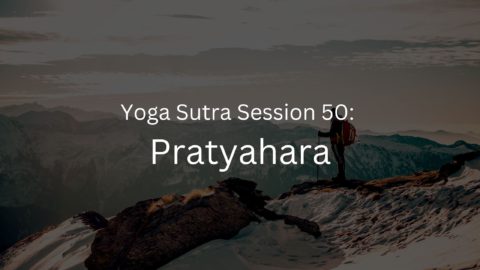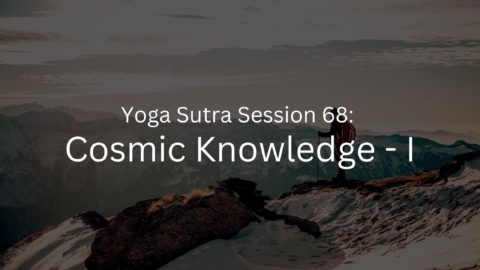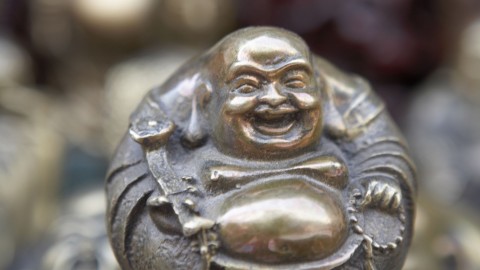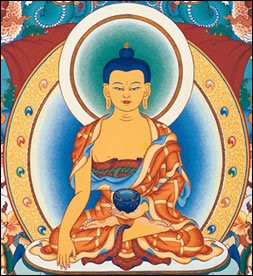Question was asked to Osho: WHY DID PATANJALI WRITE AND YOU CHOOSE TO SPEAK ON THE YOGA SUTRAS WHEN NEITHER OF YOU WAS PREPARED TO SHARE WITH US THE ESSENTIAL KEYS OF THIS SADHANA?
The essential keys can be shared but cannot be talked about. Patanjali wrote these sutras so that he can share the essential keys with you, but those essential keys cannot be reduced to sutras. The sutras are just introductory, just a preface to the real thing. Let me tell you, the YOGA SUTRAS of Patanjali is just a preface to the real transmission he wants to do. It is just introductory. It just gives you an idea that something is possible. It makes you hopeful; it simply gives you a promise, a glimpse. Then you have to do much to come close to Patanjali.
In deep intimacy the keys will be delivered to you.
And that’s why I have chosen to speak on these yoga sutras. It is just to allure you, to seduce you, so that you can come close to me. It is just to help some great thirst in you which you are carrying for lives together; but finding no way to satisfy it, finding no way how to quench it, you have forgotten about it. You have dropped it out of your consciousness. You have pushed it into the darkness of the unconscious because it is trouble. If you have a certain thirst and you cannot satisfy it, to allow it to remain in the conscious will be very, very burdensome, very troublesome. It will continuously go on knocking. It will not allow you to do other things, so you have pushed it into the unconscious.
These discourses on the YOGA SUTRAS of Patanjali are just to bring that neglected thirst into the focus of your consciousness. This is not the real work; this is just introductory. The real work starts when you have recognized the thirst, accepted it, and you are ready to change, to mutate, to become new – when you are ready to dare to go on this immense journey, the journey into the unknown and the unknowable. It is just to create a thirst, a hunger.
The yoga sutras are just an appetizer. The real thing cannot be written, cannot be said; but something can be written and said which can bring you nearer, closer to the real thing. I am ready to deliver the keys, but you have to be brought to a certain level of consciousness, a certain level of understanding. Only then can those keys start being understood by you.
I have heard:
Two beggars, really down and out, were each lying on the grass. The sun was shining above, beside them a rippling brook. It was quiet, restful, and peaceful.
“You know,” mused the first beggar, “right now I would not change places with a man who had a million pounds.”
“How about five million?” asked his companion.
“Not even for five million.”
“Well,” went on, his friend, “how about ten million?”
The first beggar sat up and said, “That’s different. Now you are talking about real money.” It is just to give you a glimpse. It is not giving you the real money but just to give you a glimpse of the real money so again the long-denied desire, thirst, discontent arises, again repossesses you, you become aflame; and then you can come close to me.
FOR YEARS I AM MOST OF THE TIME WITNESSING AND I FEEL IT LIKE A DISEASE. SO IS IT THAT THERE ARE TWO KINDS OF WITNESSING AND MINE IS WRONG? TELL ME.
It must be wrong; otherwise it cannot be felt like a disease. Self consciousness is not consciousness of the self, and there is the problem. Consciousness of the self is totally different. It is not self consciousness at all; in fact self consciousness is a barrier for consciousness of the self. You can try to watch, observe with a very self conscious mind. That is not awareness, that is not witnessing, because this will make you tense.
That’s what happens to people. You go on talking. I have never come across a person who is not a good talker; all people talk well. Talking is so human, so natural. But tell somebody to stand on a stage and talk to people. Even to a small gathering of four hundred, one thousand, people, let somebody stand; and he starts trembling and the fear arises and he feels as if the throat is choking, and suddenly words don’t come easily, the flow stops. What happens? He has always been a good talker, almost to the extent of being a bore, and suddenly… suddenly he cannot speak a word.
He has become self-conscious. So many people were watching, observing; now he feels as if his prestige is at stake. If he says something wrong or something goes wrong, what will people think about him?
He had never thought about it that way, but now with so many people facing him – and these may be the same people with all of whom he has been talking individually – but now standing on a stage looking at people, and so many people looking at him together – all their eyes like arrows penetrating him – he becomes ego-conscious. His ego is at stake; that creates the tension.
Remember, witnessing is not an ego-consciousness. Ego has to be dropped. And you are not to make it a strain. It has to be relaxed, it has to be in a deep let-go. Let me tell you one anecdote: A priest was unburdening himself to a rabbi. “Oh, Rabbi, things are very bad. The doctor tells me I am very sick and that I must have a very serious operation.”
“It could be worse,” said the rabbi.
“My congregation is deserting me for another parish because my sermons are so bad and I don’t make house calls,” continued the priest.
“It could be worse,” said the rabbi.
“My housekeeper has given in her notice, my organist has resigned, and I can’t get any boys to serve on the altar,” continued the priest, close to tears.
“It could be worse,” said the rabbi.
“The parish treasurer has decamped with the funds, and the bishop is due to make a visitation; one of the Children of Mary is pregnant, the roof leaks, and my car has been stolen,” moaned the priest.
“It could be worse,” said the rabbi.
“How could it be worse?” asked the priest, finally stung by the rabbi’s lack of compassion.
“It could happen to me,” said the rabbi.
If you are continuously thinking in terms of the ego, then even your witnessing will become a disease, then your meditation will become a disease, then your religion will become a disease. With the ego everything becomes a disease. The ego is the great inconvenience in your being. It is like a thorn in the flesh; it goes on hurting. It is like a wound.
So what to do? The first thing, when you are trying to watch, the first thing that Patanjali says is: concentrate on the object and don’t concentrate on the subject. Start from the object – dharana, concentration. Look at the tree, and let the tree be there. You forget yourself completely; you are not needed. Your being there will be a continuous disturbance in the experience of the greenery, of the tree, of the rose. You just let the rose be there. You become completely oblivious of yourself – you focus on the rose. Let the rose be there: no subject, just the object. This is the first step of samyama.
Then the second step: drop the rose, drop the emphasis on the rose. Now emphasize consciousness of the rose – but still no subject is needed, just the consciousness that you are watching, that there is watching.
And only then can the third step be taken, which will bring you close to what Gurdjieff calls self- remembering, or Krishnamurti calls awareness, or the Upanishads call witnessing. But first the two steps have to be fulfilled; then the third comes easy. Don’t start doing the third immediately. First the object, then the consciousness, then the subject.
Once the object is dropped and the emphasis on the consciousness is no longer a strain, the subject is there but there is no subjectivity in it. You are there but there is no “I” in it, just being. You are, but there is no feeling that “I am.” That confinement of “I” has disappeared; only amness exists. That amness is divine. Drop the “I” and just be that amness.
And if you have been working too long on witnessing, then for a few months, at least for three months, drop it completely, don’t do anything about it. Otherwise the old pattern may continue and may pollute the new awareness. You just for three months give a gap, and for three months you meditate with cathartic methods – Dynamic, Kundalini, Nataraj – that type in which the whole emphasis is on doing something and that something is more important. Just dancing, and the dance becomes important, not the dancer. The dancer has to lose himself completely in dancing. So for three months drop witnessing and be absorbed in some meditation. This is totally different. Being absorbed in something is completely forgetting yourself. Dancing will be very good, singing will be very good – forget yourself completely in it. Don’t keep yourself apart and divided.
If you can dance in such a way that only the dance remains and the dancer disappears, one day suddenly you will see the dancing has also disappeared. And then there is an awareness which is not of the mind and not of the ego. In fact, that awareness cannot be practiced; something else has to be done as a preparation, and that awareness comes to you. You have just to become available for it.
Tags: Patanjali The Essential Keys










